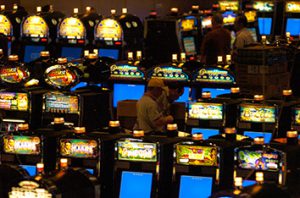Governor backs card counter banned by casino
Indiana Gov. Mitch Daniels used the story of a blackjack player’s lawsuit in telling Franklin College graduates about using
skill to push the odds in one’s favor.
Indiana Gov. Mitch Daniels used the story of a blackjack player’s lawsuit in telling Franklin College graduates about using
skill to push the odds in one’s favor.
Unsatisfied with the Hoosier Park owner’s reorganization plan, hedge funds represented by Wells Fargo Bank petition for conversion
of Chapter 11 bankruptcy into Chapter 7.
Bankrupt Hoosier Park owner Centaur Inc. has offered its creditors a risky reorganization plan. For it to work, dozens of
hedge funds must stay in the game, in return for a chance to buy a big chunk of the company later.
An Indianapolis man sued the Grand Victoria Casino and Resort after it banned him from the blackjack table in 2006. The casino
won the suit, but the state appeals court reversed that decision. The casino asked the high court to weigh in.
New York-based Moody’s Investors Service has downgraded its credit rating for Indiana Live horse track and casino, a warning
signal that the Shelbyville facility may soon follow its Anderson counterpart Hoosier Park into bankruptcy.
Indiana’s reign at No. 3 may not last more than a year. It faces new competition from Ohio and possibly Kentucky.
Centaur LLC, which filed for Chapter 11 bankruptcy protection on Sunday, plans to sell its Colorado casino. Much of its debt
was incurred to upgrade
Hoosier Park in Anderson and add its slots parlor.
Indianapolis-based Centaur LLC, owner of Hoosier Park horse track and casino in Anderson, filed for Chapter 11 reorganization
on Sunday. The company’s casino, racing and hotel operations will continue without interruption, it said.
Rep. Bill Crawford unexpectedly pulled the measure after the House defeated his amendment to allow inland casinos while approving
another one to shift some of the tax burden from two central Indiana horse racing tracks with slot machines.
Issue likely to land in House, Senate conference committee.
House Minority Leader Brian Bosma says he’ll fight any efforts to pass legislation allowing the state’s riverboat casinos
to move inland.
The Senate Appropriations Committee voted Tuesday night to remove provisions that would have allowed casinos on Lake Michigan
and the Ohio River to move inland. It also made major changes to legislation that would have required schools to hold back
third-graders if they couldn’t read well.
An Indiana Senate committee plans to vote Tuesday on a bill that would allow casinos on Lake Michigan and the Ohio River to
move inland.
An Indiana Senate committee plans to consider legislation that would allow riverboat casinos on Lake Michigan and the Ohio
River to relocate inland.
A state senator said his committee will consider legislation that would allow riverboat casinos on Lake Michigan and the Ohio
River to move inland in hopes of staving off new competition from neighboring states.
Clear signs emerged in 2009 that the Hoosier gambling market is oversaturated.
Major credit rating agencies expressed concerns that several casinos, including the state’s new horse track “racinos”
on the outskirts of Indianapolis, might go bust before the year was finished.
The Indiana General Assembly is taking its first steps toward restructuring Hoosier gambling law.
State lawmakers are weighing possible changes to state gambling laws at a time when growing competition from out-of-state
casinos threatens to cut into business at Indiana’s 11 riverboat casinos.

The Gaming Study Committee’s report said allowing riverboat casinos to relocate inland could be helpful.
Majestic Star Casino LLC owns two casinos and a hotel in Gary, a casino-hotel in Tunica County, Miss., and a casino in Black
Hawk, Colo.